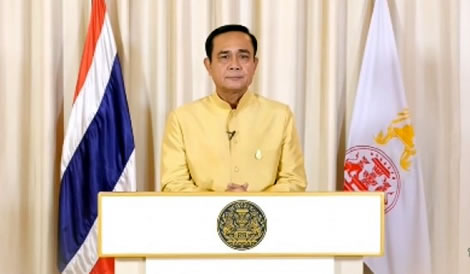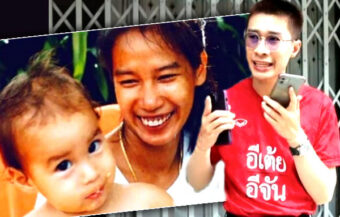Democrat Party leader suggested that any coalition deal would need a broad consensus as he rejected an approach from the former, governing Pheu Thai Party. The Prime Minister was urging Thai voters to be both discerning and patient in making up their minds about the poll. A new election date is expected to be officially confirmed shortly by the Election Commission after discussions with the government and the issuance of a royal decree.
It now seems likely that the Thai general election will be postponed although it appears that an official date will be confirmed, for the first time, shortly by Thailand’s election commission. Deputy PM Wissanu Krea-ngam has said he expects that date to be ‘sooner rather than later’ and before the coronation of the Thai King, set to take place from May 4th to 6th. In the meantime, the Democrat Party leader has rejected a coalition government proposal from former arch foes, Pheu Thai, but not completely out of hand. This while the current Prime Minister, still a public favorite for the PM job according to a new super poll, has called upon the Thai people to be discerning in examining all policies put forward by the political parties and patient before deciding who to vote for.

It is now looking increasingly likely that the general election, scheduled for February 24th, will be postponed with an announcement due shortly for the government and Thailand’s Election Commission. No formal date had ever been confirmed by the election commission but senior Thai officials, as recently as this week, had insisted that the date would be kept. The strongest indication has come from a statement by Wissanu Krea-ngam, Thailand’s Deputy Prime Minister and the government minister who first indicated that February 24th 2019 was the likely date. Now the Deputy Prime Minister has said that, due to the scheduling and the sequence of events associated with the election, in particular the aftermath and formation of a new Thai government, there may be conflict with the coronation of the Thai King and proceedings linked to the forthcoming royal celebration.
Election date will shortly be set officially by the commission and will be ‘sooner rather than later’
The Deputy Prime Minister insisted, however, that the terms of the law governing the election will be kept and that it will take place between February 24th and May 9th this year or even well before that, certainly prior to the coronation in May. It has been suggested that the date will be ‘sooner rather than later’ and it is expected that the date will be officially announced quite shortly. This will follow the issuance of a royal decree, under the terms of the election law passed by the National Assembly on December 11th last, with a date expected to be confirmed by Thailand’s election commission days later.
Concern that key post election activities in Thailand do not occur at the same time as the events associated with the royal coronation
It had been reported that officials, working with the commission, had suggested the possibility of a postponement to allow for logistical matters and a need to have the logos of all political parties printed on all ballot papers for the election when it goes head. The Deputy PM explained that there are a number of key activities, specified in Thailand’s new constitution, together with specific time frames that must take place once a poll has been conducted. The government and the election commission are concerned that these activities should not, as far as possible, occur at the same time as the historic royal coronation proceedings. This requires the government to hold talks with the election commission. It is expected that once a new schedule has been formulated, then the royal decree will be issued and that the election commission will formally confirm the poll date for the first time.
Thai Prime Minister still unaligned and has encouraged voters to keep their own options open
Meanwhile, Thailand’s existing Prime Minister has not yet thrown his hat into the ring as a candidate for the top job in the new government. A recent super poll showed him as the favorite for he job, with over 25% of the poll. He has, this week, said that he is examining carefully the policies and plans being put forward by all the Thai political parties. He is expected to join a party at some time in the future and it has been reported that he is leaning towards the new, pro junta, Phalang Pracharat Party. However, he is keeping his options open and has encouraged Thai people to do likewise in an exchange within the press.
Current Thai PM casts a critical glance over the range of political party manifestos as he weighs up the situation carefully
He told the press that he was determined to look at the plans for government of all the political parties. He cited the need for the Thai voting public to be quite discerning about not only the programmes put forward but also whether the plans were practical and could be implemented in reality. He took issue, for instance, with the education plans put forward by one of the parties, stating bluntly that the initiatives proposed would be impossible to carry out in government. It has been shown, in the past, that the Thai Prime Minister’s remarks at such conferences are heeded and well received since they appear to be a spontaneous and direct communication with the public.
Politicians and political players in election have a duty to keep to their pledges if the win the trust of the public an are able to form a government
The PM emphasised the importance of political parties, in this new era of Thai politics, being mindful of commitments and pledges to the Thai public. He said that the people would expect the politicians to honour and uphold such commitments after the election should they win enough seats to form a government. He urged the Thai electorate to look carefully and examine the proposals being presented by the range of political parties. They should question whether the policies were feasible or not. This was the approach he was taking himself, in his duty as a citizen, to vote in the forthcoming election. ‘Be patient, you don’t have to rush,’ he replied to a reporter who tried to steer him back to revealing the political party he may align his political fortunes with in the new, emerging era.
Coalition government proposal floated by Pheu Thai rejected by Democrat Party leader but door may still be open at a future point
It comes in a week when the Pheu Thai Party has raised the prospect of a coalition agreement with former political foes, the Democrat Party, in a determined effort to elect a more civilian led administration after the election comprised of a coalition between the two key democratic parties prior to the 2014 coup. This proposal has subsequently been rejected by Democrat Party leader, Abhisit Vejjajiva, albeit it not out of hand.
Abhisit rejected Pheu Thai coalition offer on the basis that any such agreement would require a broad consensus. The Democrat Party supremo highlighted the party’s new policies and the selection of candidates under way to contest the election when it is held as his key priority. The party leader highlighted the role of the party’s executive committee in the approval of these policies and explained that they will also be discussing election strategy.
The former Thai Prime Minister has expressed his concern that the current government may be in a position to gain the upper hand in political campaigning in the run up to the election. He expressed concern over the government’s possible influence over Thailand’s Election Commission due to its unique authority to remove commission members and change regulations at will.


















